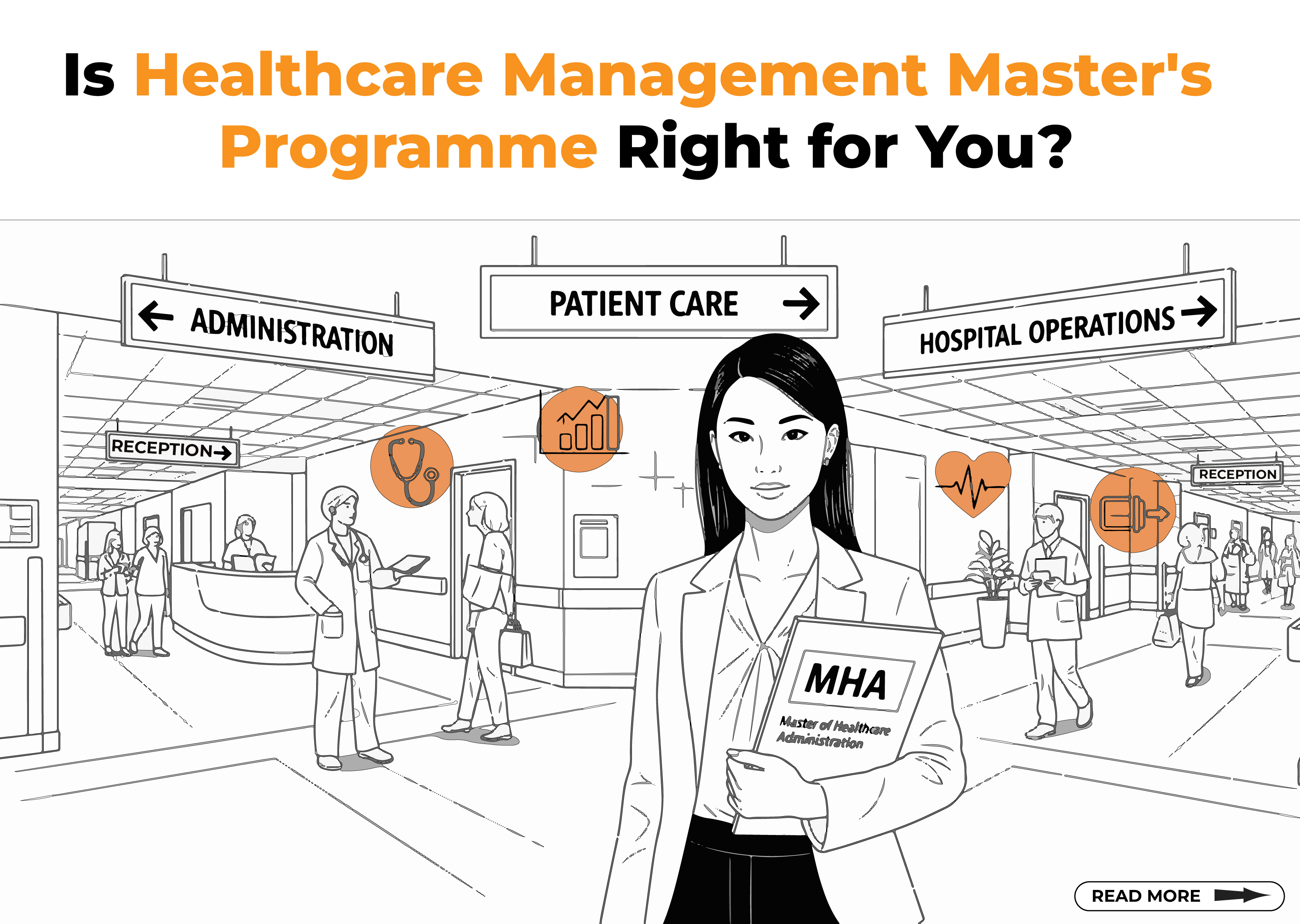Hospitals today are not just centres of healing. They are dynamic organisations with complex healthcare systems. They require leaders who can balance compassion with calculation.
If you dream of leading change in the healthcare industry, it takes more than clinical skill. It calls for vision, systems thinking and business acumen.
A healthcare management programme offers exactly that. It prepares you to run operations, manage crises, drive digital adoption, and lead health teams with empathy and efficiency. But is this the right path for you? Let’s learn.
What Does a Modern Healthcare Leader Really Do?
The days when doctors alone managed hospitals have ended. Today’s healthcare systems need structured leadership. They require professionals who understand both clinical needs and business demands.
Here’s what makes a healthcare leader effective today:
- Crisis Handling: Whether it’s a disease outbreak or a resource shortage, leaders must act fast and wisely.
- Process Management: From patient records to hospital inventory, every step needs streamlined systems.
- Digital Integration: AI diagnostics, electronic health records, and telemedicine require strong implementation strategies.
- Team Coordination: Doctors, nurses, IT staff, and administrative teams need alignment for quality care.
- Financial Oversight: Managing hospital budgets, reducing costs, and improving revenue without harming patient outcomes is crucial.
Modern healthcare leaders are system thinkers. They analyse problems, lead people, and bring sustainable improvements. These roles demand emotional intelligence, clarity, and adaptability traits that go beyond traditional management courses.
MBA vs Master’s in Hospital Administration – What’s the Real Difference?
Many students get confused when comparing an MBA healthcare management programme and a Master of Business Administration Hospital Management course. While they may look similar, the focus and outcomes differ.
Let’s break it down:
- An MBA in Hospital and Healthcare Management blends core business modules like finance, marketing, and strategy with healthcare-specific subjects.
- A Master of Business Administration in Hospital Management is more focused on hospital operations, facility management, healthcare laws, and patient services.
Choosing the right degree depends on your career goals:
| Your Career Goal | Best Fit Degree |
| Want to lead hospital operations | Master of Hospital Administration |
| Interested in consulting or health tech | MBA in Healthcare Administration |
| Looking for business leadership roles | MBA in Hospital Administration And Healthcare Management |
| Wish to work in public health policy | Either, depending on specialisation |
Both degrees are recognised and respected. However, an MBA degree in healthcare administration may offer more flexibility across sectors like insurance, consulting, and technology.
Why India is Seeing a Boom in Specialised Healthcare MBAs?
India’s healthcare landscape has transformed significantly in recent years. While the pandemic revealed critical gaps, it also accelerated innovation and reform. From digital health initiatives to expanded infrastructure, the sector is evolving rapidly. With this shift comes the urgent need for skilled professionals who can lead hospitals, streamline operations, and manage complex healthcare systems. Today’s healthcare leaders must blend medical understanding with strategic thinking and organisational skills. Whether it’s implementing health policies or driving large-scale projects, the demand for capable managers is higher than ever. India now looks to a new generation equipped to shape the future of healthcare delivery.
Why Are MBA in Hospital Management Colleges in India Gaining Popularity?
- Growing Demand: Analysts expect India’s healthcare sector to reach USD 638 billion by 2025. This creates space for business-savvy professionals.
- New Health Ventures: Digital health platforms, health insurance startups, and diagnostics companies are looking for leadership talent.
- Global Health Focus: International funding in Indian healthcare is rising. Trained managers can bridge policy, research, and delivery.
- Better Salaries: Leadership roles in hospitals and healthcare startups now offer competitive pay and faster growth.
Many institutes also include preparation for entrance exams as part of their curriculum. These may include group discussions, aptitude tests, and interviews. Some even allocate up to 50 marks for interpersonal and leadership skills.
Universities have responded by offering MBA health care management programmes that combine classroom learning with industry exposure. These courses include hospital visits, simulation labs, policy research, and live projects.
What Type of Professionals Succeed in This Field?
This field welcomes diverse professionals. You do not need a medical degree for success. What truly matters is a positive mindset and a commitment to making real change.
Let’s explore who thrives in healthcare management:
- Clinicians – Doctors, dentists, and nurses who want to shift to leadership or administration.
- Engineers and IT Grads – Those who want to build or manage digital health platforms.
- Business Students – MBAs looking to specialise in a fast-growing, meaningful sector.
- Public Health Professionals – Those with experience in community healthcare or policy development.
Common traits of successful healthcare leaders include:
- Operational Mindset: Understanding systems and how to improve them.
- People Skills: Managing large teams with sensitivity and clarity.
- Quick Thinking: Making decisions during high-pressure situations.
- Resilience: Handling setbacks while staying focused on patient outcomes.
Soft skills matter as much as your degree. Those who can balance empathy with analytics often become the most respected leaders.
Where Can You Go After a Healthcare Management Degree?
A healthcare management master’s programme is not just about one job, but it opens many doors. Graduates move into hospitals, NGOs, policy institutes, startups, and insurance firms.
Top career options include:
- Hospital COO (Chief Operating Officer): Oversee hospital operations, staffing, services, and finances.
- Healthcare Consultant: Work with governments, hospitals, or startups to improve efficiency or scale up.
- Digital Health Strategist: Plan and execute health tech platforms and solutions.
- Policy Advisor: Support state or central government health reforms and social health missions.
- Insurance Sector Roles: Manage operations, customer experiences, and compliance in health insurance.
- Entrepreneurship: Launch your own health startup or wellness venture.
Where can you work?
- Private and public hospitals
- Global NGOs and public health foundations
- Health insurance and TPA firms
- Government health mission
- Research and consulting firms
- Digital health startups and app-based platforms
This field offers both stability and growth. You can lead small teams or entire institutions. You can stay in one sector or pivot across several. The career opportunities are rich and future-ready.
Why Choose LPU for Your Healthcare Management Journey?
Lovely Professional University is among the top MBA in hospital administration colleges and MBA in healthcare management in India. It blends theory with practical training and offers global exposure.
Here’s why LPU stands out:
- Industry-Led Curriculum: Courses are designed in collaboration with hospital leaders and healthcare innovators.
- Experienced Faculty: Learn from professionals who’ve worked in top hospitals, NGOs, and government sectors.
- Hands-on Projects: Engage in hospital management simulations, real-time problem solving, and live consultancy projects.
- Internship Opportunities: Get placed in reputed hospitals, health startups, and public health agencies.
- Global Tie-Ups: Collaborate with international students and faculty, adding global healthcare insights to your learning.
- Placement Support: Access to top recruiters like Fortis, Medanta, Apollo, and health insurance companies.
LPU prepares you for leadership right from the beginning. It doesn’t matter whether you aim to change hospital systems, work in digital health, or influence national policy.
Conclusion
Healthcare is changing fast. It now needs leaders who understand patients and processes, medicine and management, empathy and efficiency. If you want to improve systems instead of just treating illness, a healthcare management master’s programme is the right choice for you.
This degree is more than just a qualification. A platform to lead change, solve real-world problems, and create better health outcomes for millions exists. To manage hospitals, start a health-tech company, or create policy, the future needs people like you.
At Lovely Professional University you’ll find the support, resources, and guidance to shape that future. So don’t just follow a path. Create one



![Career Paths after B.Sc. Information Technology [Lateral Entry] Career Paths after B.Sc. Information Technology](https://www.lpu.in/blog/wp-content/uploads/2025/12/Career-Paths-after-B.Sc_.-Information-Technology-218x150.jpeg)










